—
I didn't return to crime when I got out. By then I couldn't. The man I was when I walked into Alcatraz in 1934 didn't make it out. I was released in 39, not because I served my full sentence, but because I was falling apart. The syphilis had rotted my mind. Years of it going untreated had eaten away at my nerves, my memory, my ability to think straight. The government didn't see a criminal mastermind anymore. They saw a broken man, mentally diminished, barely able to hold a full conversation. They transferred me first to Terminal Island in California to finish my sentence, then released me formally in November 1939 for medical reasons. I went home to Palm Island, Florida, where May and Sonny were waiting. That house, once the symbol of all my power, became my sickbed. I spent my last years walking the garden, staring out at the water, being watched by doctors, mumbling fragments of old songs, picking at my banjo. I was done with the outfit, and they were done with me. The world had moved on, new bosses, new rules, new wars. So no, I didn't return to crime. I returned to silence and waited for the end. like a man who'd already been buried once.
Let me tell you a few words about one of my brothers, James Vincenzo Capone. He was the oldest of us. Born in Italy before the rest of us came along in Brooklyn. But Jimmy? He didn't stick around. He left home young. Didn't like the chaos, the fights, the noise of the city. Didn't like me either, once I started making a name in the streets. He wanted to go straight, clean. He even changed his name. Went by Richard Hart out west. Tried to bury the Capone name like it was a curse. And get this, he became a prohibition agent. Yeah. While I was building an empire off bootleg liquor... My own brother was out there wearing a badge, smashing stills, raiding joints, preaching about law and order. They called him Two-Gun Heart— said he wore cowboy boots and carried twin pistols like something out of a dime novel. Tried to clean up little prairie towns in Nebraska and South Dakota.
We were like night and day. Me, the outlaw king of Chicago. Him, the lawman of the plains. But you know what? I didn't hate him for it. I think in his way, he was just trying to find his place, just like I was. And deep down, blood is blood. When our folks died, when times got hard, he came back around. Quietly. Not for headlines, for family. He visited once when I was sick in Florida. Didn't say much. Just sat there a while. So yeah, one of my brothers wore a badge. And maybe in another life we could have stood on the same side of something. But fate don't deal that way.
He went west. I went down. But we were both Capones. And we both fought. Just on different battlefields. My relationship with May after I got out of prison... It changed. Yeah, how could it not? But the real miracle is that it survived. When I walked out of Alcatraz in 39, I wasn't the same man she married back in 1918. Not by a long shot. I'd gone in strong, sharp, in control. A king. I came out broken, sick, slowed. The syphilis had done its work, fogging my brain, messing with my memory, dulling my speech. Sometimes I couldn't even put sentences together. The man who once commanded armies of men with a look couldn't find the words to ask for a glass of water. But May? She stayed. Through all of it. She brought me home to our place in Palm Island, Florida. And she took care of me. Not just in name, in every way. She managed the house. Managed the doctors. kept the reporters and vultures away, protected Sunny from the worst of it. And when I was too far gone to understand where I was, she was still there, sitting at my side, brushing back my hair, like I was still her owl. It wasn't the same kind of love we had when we were young—Fiery, passionate, full of plans. It was deeper than that. It was the kind of love that doesn't need words, the kind that endures.
She didn't sign up to be the wife of a legend, or a convict, or a dying man. But she bore it with grace. Catholic, loyal, proud in her own quiet way. So yeah, our relationship changed, but not the part that mattered. She was there when I rose, and she was there when I fell. In the end, May Capone was the only thing I never lost.
I acquired the Palm Island property in 1928, right at the height of my power. I was still running Chicago then. The outfit was bringing in millions from bootlegging, gambling, and protection. The city was mine, the newspapers couldn't get enough of me, and I figured it was time for a little paradise, somewhere warm, private, beautiful, where I could take May and Sonny away from the chaos, at least now and then. So I bought this Spanish-style mansion on Palm Island just off the coast of Miami. Back then it was still being developed, man-made, luxury all the way. Waterfront views, tropical breeze, a dock for the boat. Cost me about $40,000, which was big money in those days, but to me, it was pocket change. People say I bought it to lay low. That ain't the whole story. I bought it to live like a king.
I hosted parties there. Not like in the movies—no machine guns in the garden. But high end. Politicians, entertainers, friends, family. I kept it respectable. Palm Island wasn't for business. It was for escape. Funny thing is, years later, when I got out of prison, that mansion became my cage. I returned there not as the King of Chicago, but as a sick, fading man. Same walls, same sea breeze, but a different world. So yeah, 1928. That's when I bought Palm Island. And I thought I was buying peace. Turns out, I was buying the place where I'd wait out the end.
What happened to my fortune? It disappeared. Not all at once, not in flames or in court, but piece by piece, like sand slipping through your fingers. See, people think I died a millionaire. They picture vaults of cash, gold, hidden in the walls. Truth is, by the time I got out of Alcatraz in 1939, I was broke in every way that mattered, physically, mentally, and financially. Let me break it down. The government hit me hard during the tax trials. I paid huge fines, back taxes, court costs. I had top lawyers, and those boys don't work cheap, especially when they're defending Al Capone.
While I was inside, the outfit moved on without me. I was no longer calling shots. Other guys took over. Smart man, and they knew better than to keep sending me money once I lost power. My businesses—The clubs, breweries, racetracks either dried up or got swallowed by someone else. The feds were watching everything. They froze what they could. Any legit accounts tied to me were either drained or tied up in court. And most of my income wasn't even on paper. It was cash buried in the flow of operations I no longer controlled. After I got out, I wasn't just sitting on a beach. I was sick. advanced neurosyphilis, losing my mind by inches. May had to hire doctors, nurses, guards, and caretakers just to manage my decline. All that care? It burns through whatever you've got left. Even with less income, we still had to maintain Palm Island, the staff, the upkeep. And we weren't exactly clipping coupons. In 1947, we had just enough to keep the house. No empire. No vault. Just a man sitting in the sun, playing a banjo, lost in his own mind.
They say crime doesn't pay. Well, it did. But it doesn't last. Not when the law, time, and sickness all come to collect.
If I had my life to live over again, I wouldn't chase the crown so hard. Don't get me wrong. I was good at what I did. Real good. I built an empire from nothing. I took scraps in Brooklyn and turned them into bootleg millions. People feared me, respected me, envied me. But at what cost? If I could do it again, I'd still be ambitious. Still be smart. Still take care of my people. But I'd stay in the shadows. I wouldn't grab the spotlight, wouldn't plaster my name across Chicago… like a billboard. Because that's what brought the heat. That's what made me a target. Not just to the cops, but to the press, the politicians, and my own kind. Pride. That was my flaw. I'd also get treatment for my illness early on.
I knew something was wrong years before I did anything about it. I ignored it. Figured I was invincible. By the time I cared, it was too late. That disease didn't just destroy my body. It took my mind. Turned me into a ghost before I ever hit the grave. And I'd spend more time with May and Sonny. Not just sending gifts. Not just promising things later. I mean being there. Watching my boy grow up. Making my wife laugh. Living like a man. Not a legend. They stood by me through everything, and I gave them too little in return. Would I still hustle? Yeah. But I'd do it smarter. Slower. Less noise. More legacy. Because in the end, it wasn't the bullets or the boos that finished me. It was me. My choices. My pride. …and the silence that came after the spotlight burned out. If I could live it over, I'd trade the empire for peace. I'd trade the headlines for time.
Sonny Albert Francis Capone, my only son. You ask me what I felt toward him? Everything. Pride, fear, regret. But above all, love. The kind that don't wear out, even when your name gets dragged through the mud and your life turns to ashes. From the moment he was born. December 4th, 1918. I looked at that boy and thought, Let him be better than me. I wanted to give him the world, but not the one I lived in. I built an empire from the street up, but I didn't want him anywhere near it. I wanted him in suits, not in courtrooms. I wanted him to walk into a room with his head high and no gun under his coat.
Did I think he'd go into a life of crime? No, and I made damn sure he didn't. I shielded him from it. Kept him out of the rackets, out of the business, out of the meetings. I wanted him to live clean. And thanks to May, who was a rock through it all, he did.
The worst he ever got into was changing his name to Albert Brown, just to get away from mine. And you know what? I didn't blame him. He worked for the government at one point, got married, had kids. He lived a life I never could. And that... That was my greatest accomplishment.
I wasn't much of a father toward the end. Prison, sickness, shame. They kept me distant. But I wrote him. Thought of him every day. And when I was sitting there in Florida, in that white house that used to mean something, sick and slipping, the only thing I held on to was the thought, at least I didn't drag my boy down with me. And for a man like me, That's about as close to peace as you can get.
—
Part 2 of 3:
Al Capone in his own words: Part 2 of 3 —with transcript
1910 was a different world. The kind of world where the air smelled like coal smoke and horses still out numbered cars. I was just a boy back then, around 11 years old, running the streets of Brooklyn with scuffed shoes and a head full of dreams. Or trouble — depending who you asked.
Part 1 of 3 in this post:
Outside the Law. 1920 film
Outside the Law. 1920 American pre-Code crime film produced, directed and co-written by Tod Browning. Starring Priscilla Dean, Lon Chaney and Wheeler Oakman.
—
Part 3 of 3 (link to Bob Dylan’s Instagram account): https://www.instagram.com/reel/DKsBzUdiySn/?igsh=a3k2bGppNXhoam14
—
Bob Dylan — Nightfall. Point Blank (Quick Studies). 2024.
—
Nightfall. 2025. Oil paint on paper.
http://www.nightlymothpaintings.space
—
Best wishes
nm.

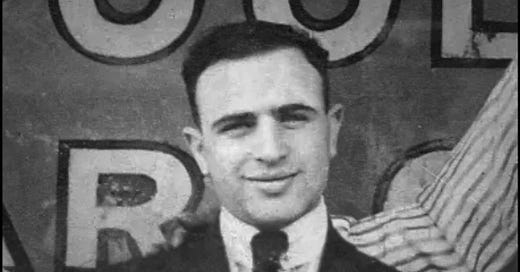


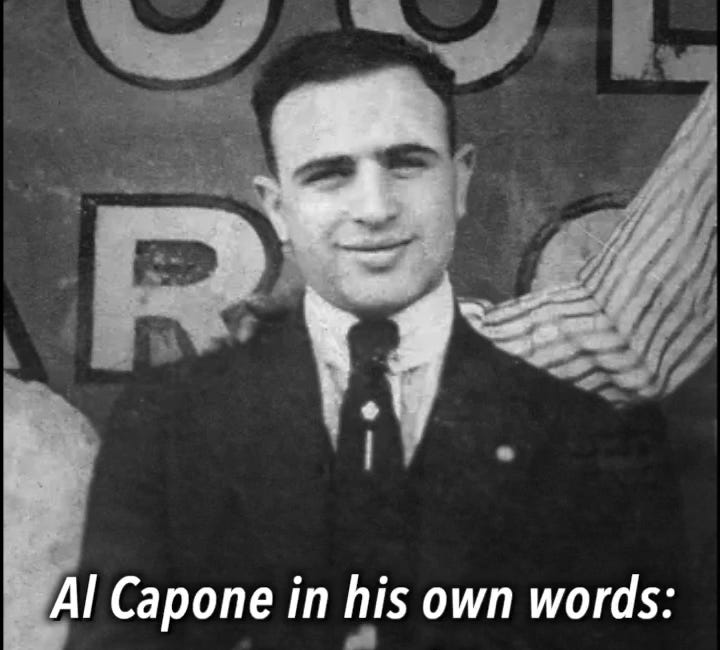

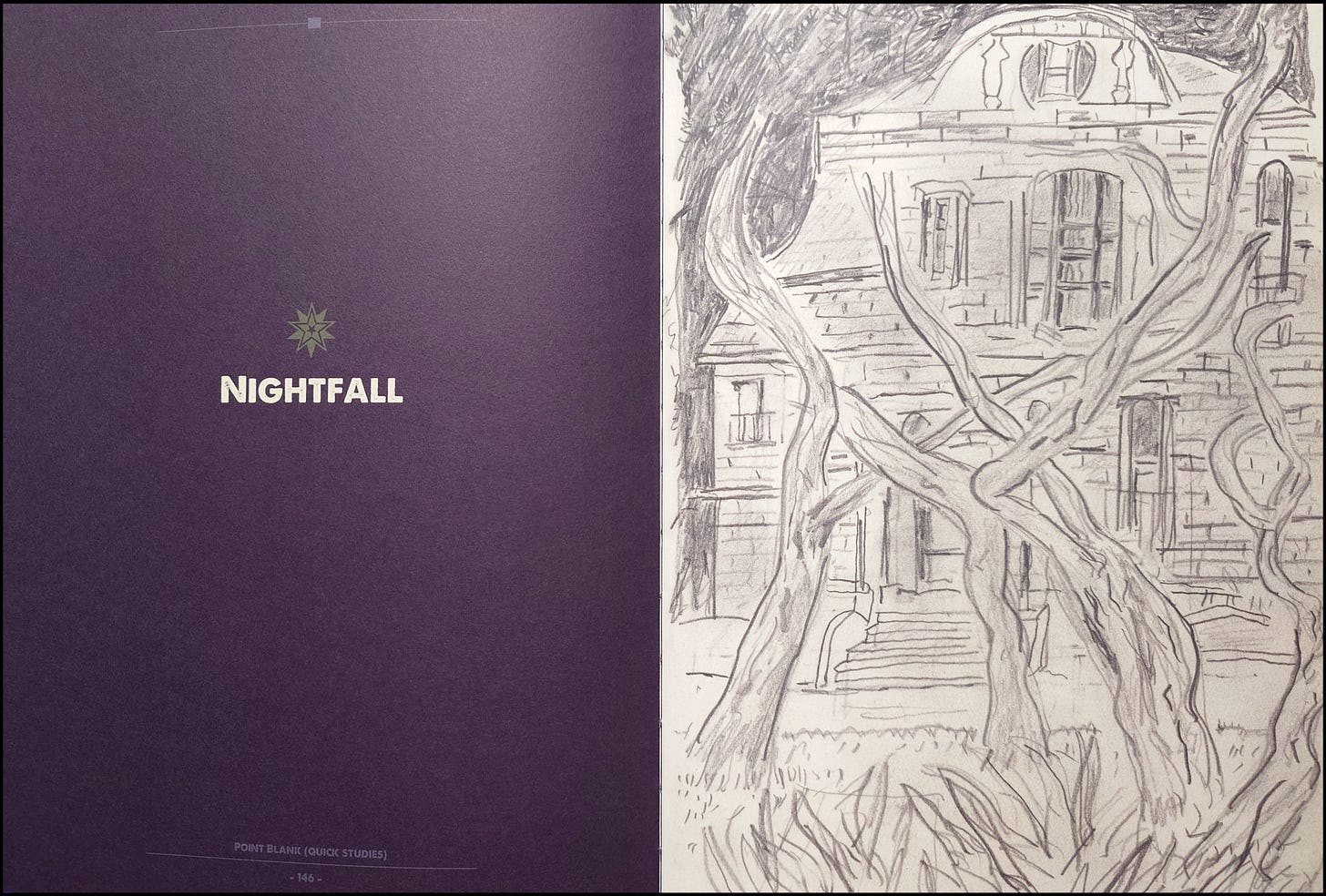
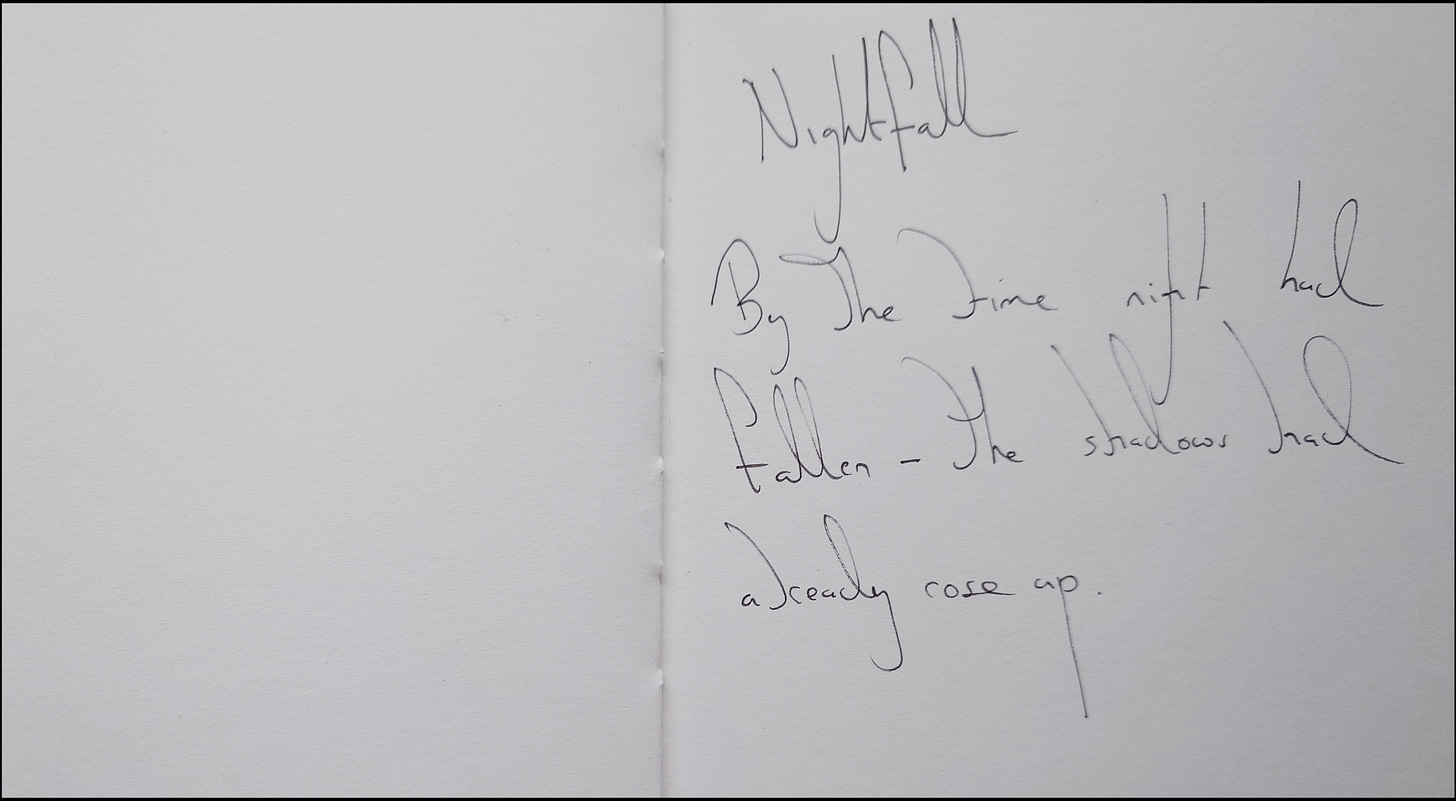
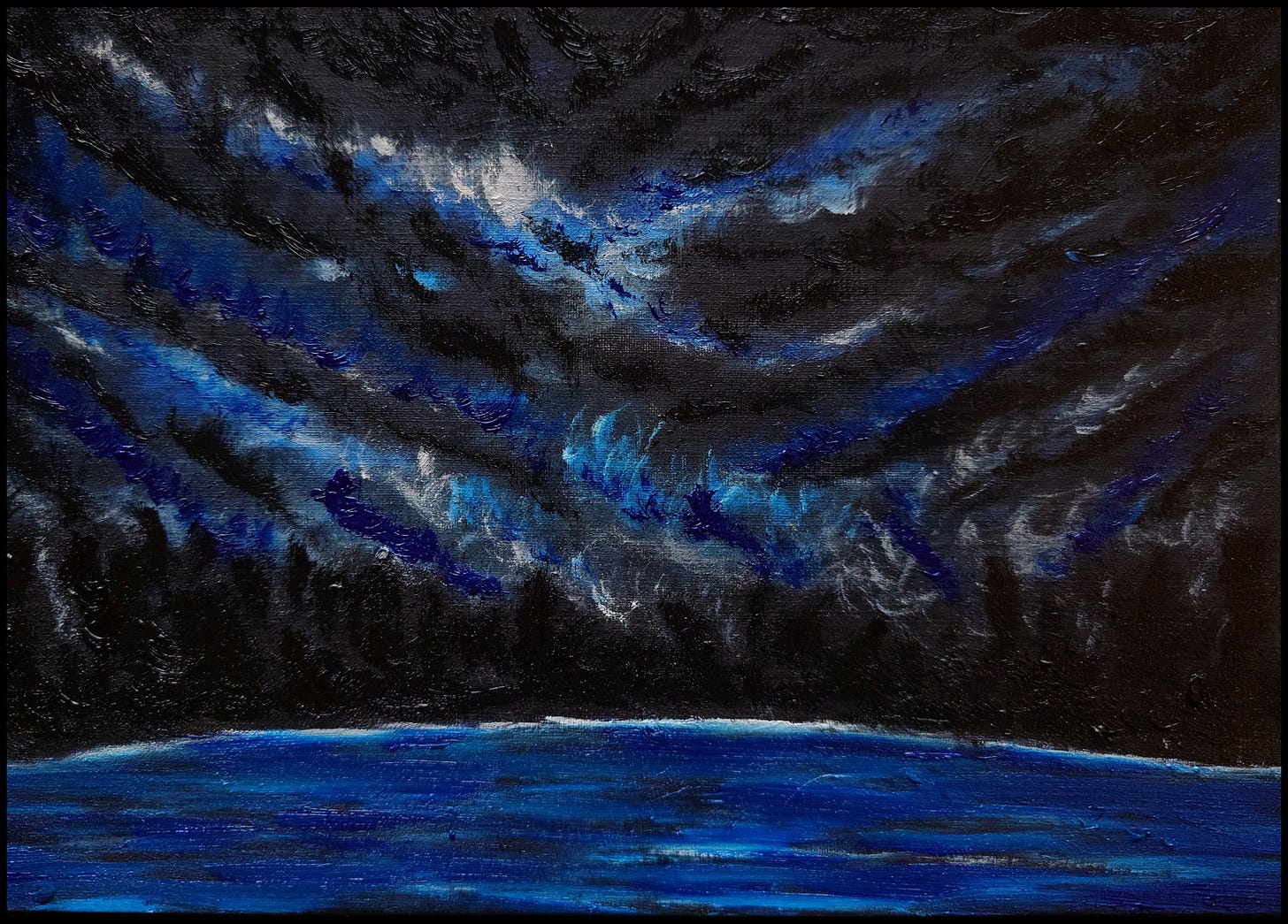









Share this post